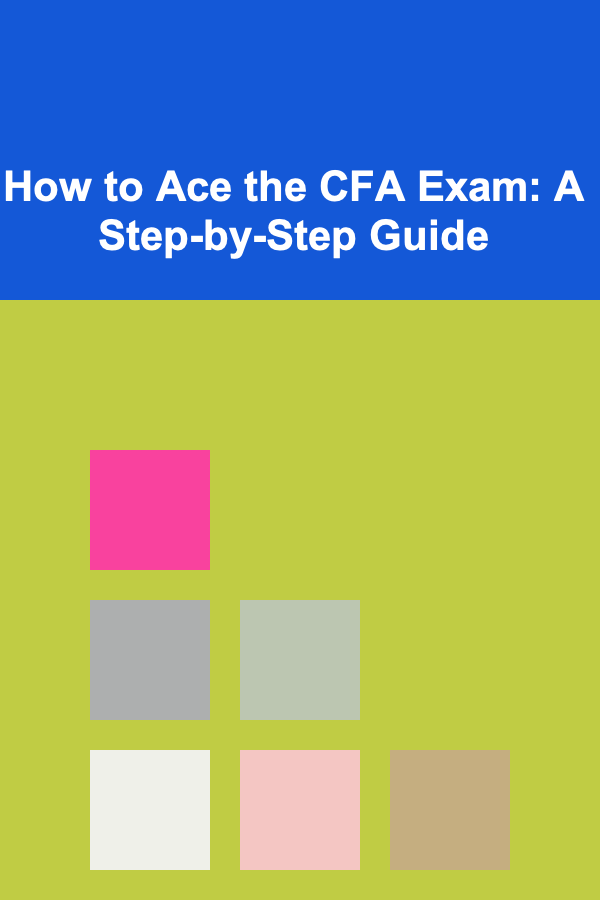
How to Ace the CFA Exam: A Step-by-Step Guide
ebook include PDF & Audio bundle (Micro Guide)
$12.99$11.99
Limited Time Offer! Order within the next:

The Chartered Financial Analyst (CFA) exam is one of the most prestigious and challenging professional qualifications in the field of finance. The CFA credential is highly respected in the financial industry and signifies a deep level of expertise in investment management, financial analysis, and ethical standards. However, passing the CFA exam requires rigorous preparation, strategy, and dedication.
Whether you are just starting your CFA journey or preparing for an upcoming level of the exam, this guide will help you understand how to prepare effectively and maximize your chances of success. It covers everything from understanding the CFA curriculum to creating a study schedule, mastering the exam content, and taking the exam itself.
Understanding the CFA Exam Structure
Before diving into study strategies, it's essential to have a clear understanding of the structure of the CFA exam. The CFA program is divided into three levels, each building on the knowledge and skills tested in the previous level.
1.1 CFA Level I
Level I focuses primarily on basic knowledge and comprehension of financial concepts, including ethical standards, quantitative methods, economics, financial reporting, corporate finance, and portfolio management. The Level I exam consists of two sessions of 90 multiple-choice questions, totaling 180 questions.
1.2 CFA Level II
Level II is known for its emphasis on the application of financial concepts. It tests candidates on asset valuation, financial reporting, equity analysis, and the use of advanced financial tools. The exam consists of 120 multiple-choice questions, divided into 60 questions per session. Additionally, there are vignette-based questions that require you to analyze case studies and apply your knowledge to real-world situations.
1.3 CFA Level III
Level III is the final and most advanced level of the CFA exam. It focuses on portfolio management, wealth planning, and the application of investment management strategies. The exam consists of two parts: the morning session, which is composed of essay-based questions, and the afternoon session, which is made up of 10 vignette-based multiple-choice questions.
Understanding the specific content and format of each level is crucial to developing an effective study plan. Each level requires a different approach, and you'll need to adapt your preparation strategies accordingly.
Creating a Study Plan
A well-structured study plan is the foundation of successful CFA exam preparation. The CFA Institute recommends that candidates spend approximately 300 hours preparing for each level of the exam. While this number can vary depending on your background and familiarity with the material, the following steps will help you create an efficient and sustainable study schedule.
2.1 Set Realistic Goals
Before you begin studying, set clear and achievable goals for yourself. Ask yourself the following questions:
- When is the exam date?
- How much time do you have to study?
- What is your current level of knowledge in the CFA curriculum?
Be realistic about your available time and your current understanding of the material. Your study plan should take into account any other commitments you have, such as work or family obligations.
2.2 Breakdown of the Curriculum
The CFA curriculum is vast, and it covers a wide range of topics. Breaking down the curriculum into manageable sections will help you stay focused and organized. Here are the key topics covered in the CFA exams:
- Ethical and Professional Standards
- Quantitative Methods
- Economics
- Financial Reporting and Analysis
- Corporate Finance
- Equity Investments
- Fixed Income
- Derivatives
- Alternative Investments
- Portfolio Management
- Wealth Planning (Level III)
Allocate time to study each section based on its importance in the exam. Ethical and Professional Standards, for instance, is a significant topic in all three levels of the exam and should be studied thoroughly.
2.3 Develop a Study Schedule
Once you've broken down the curriculum, create a study schedule that outlines what you will study each week. Make sure to:
- Set specific goals for each study session (e.g., complete one reading or practice a set of questions).
- Allocate time for reviewing and reinforcing previous topics.
- Include regular breaks to prevent burnout.
A sample study schedule for Level I might look like this:
| Week | Topic | |------|-----------------------------------| | 1 | Ethics and Professional Standards | | 2 | Quantitative Methods | | 3 | Economics | | 4 | Financial Reporting and Analysis | | 5 | Corporate Finance | | 6 | Equity Investments | | 7 | Fixed Income | | 8 | Derivatives | | 9 | Alternative Investments | | 10 | Portfolio Management |
As you move through the weeks, adjust the schedule as needed based on your progress.
Study Strategies for Success
Now that you have a study plan in place, it's time to explore some effective study strategies to help you absorb and retain the vast amount of information required for the CFA exam.
3.1 Use the CFA Curriculum and Study Materials
The CFA Institute provides its official curriculum for each level, which is comprehensive and aligned with the exam's content. It's essential to study the CFA curriculum thoroughly, as this is the primary source of information for the exam.
However, many candidates also choose to supplement the CFA curriculum with study materials from third-party providers like Kaplan Schweser or Wiley. These materials often offer condensed summaries, practice questions, and mock exams, which can be helpful for reinforcing your understanding.
3.2 Active Learning
Passive reading alone is not enough to succeed in the CFA exam. Instead, focus on active learning techniques such as:
- Taking notes: Writing down key concepts helps reinforce your understanding and serves as a useful reference for later review.
- Summarizing: After studying a chapter or section, try to summarize the main points in your own words.
- Practice questions: Doing practice questions and mock exams is essential for testing your knowledge and identifying areas where you need to improve.
- Flashcards: Create flashcards for important concepts and formulas to help with memory retention.
3.3 Focus on Ethics
Ethical and Professional Standards are tested in all three levels of the CFA exam and are weighted heavily in the scoring. To excel in this section:
- Review the CFA Institute's Code of Ethics and Standards of Professional Conduct regularly.
- Practice answering questions related to ethics, as the phrasing can be tricky and require a deep understanding of the material.
- Make ethics a daily part of your study routine to keep it fresh in your mind.
3.4 Time Management
The CFA exam is long, and time management is key to success. During your preparation, practice time management by:
- Allocating time to each question during practice exams to simulate the exam environment.
- Being mindful of your pace during study sessions so that you don't spend too much time on any one topic at the expense of others.
3.5 Focus on Weaker Areas
As you progress through your studies, identify areas where you are weaker and devote more time to those topics. Use your performance on practice questions to gauge which areas require additional focus.
Taking the CFA Exam
On exam day, your preparation will be put to the test. It's important to approach the exam with a clear strategy to maximize your chances of success.
4.1 Get a Good Night's Sleep
Make sure to rest well the night before the exam. A well-rested mind performs much better than one that is fatigued or stressed.
4.2 Arrive Early and Be Prepared
Arrive at the exam center early to ensure you have enough time to settle in. Bring all necessary materials, such as:
- Your CFA exam admission ticket
- A valid photo ID
- Approved calculators (check CFA Institute guidelines for approved models)
- No. 2 pencils
4.3 Manage Your Time During the Exam
During the exam, keep an eye on the clock to ensure you're pacing yourself appropriately. If you come across difficult questions, don't dwell on them for too long. Answer the ones you know first and come back to the harder ones later.
4.4 Stay Calm and Focused
It's normal to feel nervous before the exam, but staying calm and focused will help you perform better. Take deep breaths, stay positive, and trust in the preparation you've done.
Conclusion
Acing the CFA exam requires dedication, strategy, and effective preparation. By understanding the exam structure, creating a solid study plan, and using proven study strategies, you can increase your chances of success. Remember to focus on mastering the core concepts, practicing questions, and managing your time efficiently. With careful planning and hard work, you'll be well on your way to earning your CFA designation and advancing your career in finance.
Reading More From Our Other Websites
- [Screen Printing Tip 101] Must-Know Screen-Printing Tips Every Visual Artist Should Use
- [Personal Care Tips 101] How to Choose a Brow Gel with Ingredients That Nourish Your Brows
- [Home Renovating 101] How to Incorporate Sustainable Materials into Your Home Renovation
- [Home Lighting 101] How to Achieve a Modern Look with Contemporary Lighting
- [Organization Tip 101] How to Use Color-Coding for Different Food Categories
- [Organization Tip 101] Space-Saving Tips for Small Bathroom Renovations
- [Personal Care Tips 101] Best Natural Deodorant Options for Athletes & Active Lifestyles
- [Personal Finance Management 101] How to Build Multiple Income Streams for Financial Security
- [Star Gazing Tip 101] Charting the Cosmos: How Modern Stargazing Fuels Space Exploration
- [Organization Tip 101] How to Set Up a Reunion Check-In Station for Smooth Arrivals

How to Organize Transportation for Large Family Groups
Read More
How to Style Your Dining Room for Less
Read More
How To Understand the Forgetting Curve and How to Beat It
Read More
How to Use Deep Learning for Passive Income in the Gig Economy
Read More
How To Apply Skepticism to Everyday Beliefs
Read More
How to Communicate Insights Effectively as a Business Intelligence Analyst
Read MoreOther Products

How to Organize Transportation for Large Family Groups
Read More
How to Style Your Dining Room for Less
Read More
How To Understand the Forgetting Curve and How to Beat It
Read More
How to Use Deep Learning for Passive Income in the Gig Economy
Read More
How To Apply Skepticism to Everyday Beliefs
Read More